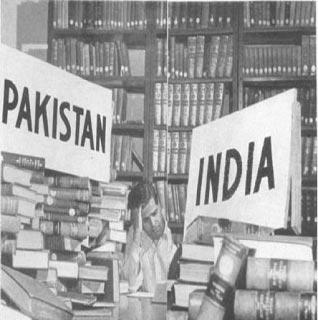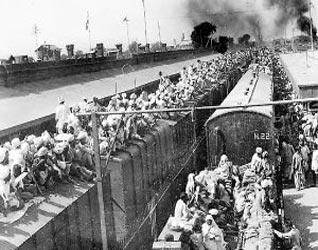Partition
Cyril John Radcliffe:
For 40,000 Rupees, He Tore A Land Asunder
A Poem by MICHELE GIBSON
Radcliffe knew the law
Renowned for justice
Learned in the details and decorum of the court
The proper poise and salutation to the magistrate
Inner chambers
Inner workings
Inner demons
Receives his brother' s spectacles and compass but to no avail
He is seconded and sequestered to measure out by reason and design
The most elusive and disparaging of lines
He cuts through culture, infrastructure, dread
He disregards recommended views
He loosely clustered faith affiliation
And jackknifed altogether reconciliation
He worked
Under the gun
Under the lamplight
Under heady misappropriation
He faltered over streams and river beds
He ate and drank and slept so little
That his pen would spill out quadrants and degrees where nothing led
He knew little of the land he resurrected
Of the arguments retired from the day before
He took no time to see the people
Or walk among the pious
He heard no plea
But butchered up the land in metered gore
He sought no ritual, no faith, no special meaning
Tasted not a morsel of the history
Ancient ownership or claim, nostalgia, siege or coup
Diced up, now, to replenish misery
Regardless, Radcliffe drew the God forsaken line with
A hand abandoned
A stone cold faith
And a naïve ideology
At a loss or out of time to reconsider or review
He drew in conflict and he outdrew
A millennium of social camaraderie
A civil, political economy
A pastoral geography
For 40,000 Rupees, 40 scratch of silver
(He never claimed the fee)
He foresaw the ink spilled on the page
He foresaw the war as yet to wage
He foresaw the blood, the savagery, the rage
He drew the line with haste and fear and drew away
Mortified by candour he would flee
40,000 Rupees waits somewhere, quietly
Blood money
Blood conflict
Bloody shame
The Radcliffe line devoured all he knew
Diminished justice
Diminished equity
Diminished Radcliffe
All diminished by his narrow view
Radcliffe and the ethno-centric British
Think nothing of the lives they recklessly outdrew
October 20, 2010
Conversation about this article
1: Amar Singh (Glasgow, Scotland), October 20, 2010, 10:13 AM.
With a few deft strokes, you have torn the veil off the criminal act of partitioning Punjab, and captured the most callous manner in which it was done - and, with your extraordinary poem, you've now torn my heart asunder! So true: a man with no training, no experience, no time, no resources, no staff, no patience, no humanity, spent a few hours bisecting a land and a people, with total disregard for history, human decency, geography, humanity, reality ... and then, he fled back to England with his tail between his legs. In a fair world, he and his ilk - his masters were equally responsible! - would've been tried in a Nuremberg-style trial for crimes against humanity.
2: Sukhmani Kaur (Chandigarh, Punjab), October 20, 2010, 10:34 AM.
No doubt an extremely gifted poet, you are also a historian par excellence! Your tightly knit words are loaded not only with pages and pages of historical facts, but drip with emotion, tears, blood, pain, anger, outrage! Thank you for doing what even our historians - and writers - have failed to do.
3: Keith Lowden (London, United Kingdom), October 20, 2010, 1:08 PM.
A powerful description of a weak and silly man willingly playing like a puppet in the hands of a cowardly and spent empire. What was 'Great' about Britain, other than that it was a great looter and plunderer? Makes me ashamed of our history to the very core of my being.
4: Inderjit Kaur (Lexington, Kentucky, U.S.A.), October 20, 2010, 3:58 PM.
Simply exquisite! Thank you, Michele, for describing a most tragic chapter of human history with such emotion ... and finesse.
5: Kanwarjeet Singh (Franklin Park, New Jersey, U.S.A.), October 21, 2010, 12:46 AM.
Dear Michele, what a well composed poem. It indicates the pain and the anger. I think all of us can take a lesson from history: "United we stand, divided we fall" - as Indians, we were never united (and still are not), hence we paid the price in 1947. Also, we should remember that the person drawing the maps on a piece of paper should not get all the blame - we cannot conveniently forget the greedy politicians of the time - whether Indian, British or Pakistani who played with millions of lives. We should remember how Nehru was flirting with power, Gandhi was busy with his sham of a simple lifestyle, Jinnah was hastily carving out a new nation, and the Brits were busy packing their loot, while innocents were just hours away from being raped, looted and murdered. It is important to educate people on the realities of the time because most of the younger generation have no clue of the same.
6: Jasbir Singh (Oxford, United Kingdom), October 21, 2010, 7:51 AM.
I agree, Kanwarjeet ji: Radcliffe cannot be blamed for the Partition, for which, of course, others were largely responsible. But, we need to remember that Radcliffe was no ordinary man. He was Cyril John Radcliffe, 1st Viscount Radcliff,e GBE, PC, QC - a British lawyer and Law Lord; he was highly educated and lived a privileged life. He should have had the decency to stand up for basic human principles and refused to carve out a border in a matter of a few weeks, without doing ANY research, consultation, surveys, etc. He knew of the possible cataclysmic consequences of what he was doing and should have demanded more time and resources from his masters ... or simply refused the job. Instead, he kowtowed to the cowardly wishes of his British benefactors. On his part, it was a total betrayal of his humanity, his profession, his rank ... This poem deals with his contribution to the tragedy; I don't see it putting all the blame on his shoulders.
7: Amarjit Singh Chandan (London, United Kingdom), October 21, 2010, 1:45 PM.
Here is what one of the greatest English poets of the 20th century wrote: "PARTITION" by W.H. Auden - "Unbiased at least he was when he arrived on his mission,/ Having never set eyes on the land he was called to partition/ Between two peoples fanatically at odds,/ With their different diets and incompatible gods./ 'Time,' they had briefed him in London, 'is short. It's too late/ For mutual reconciliation or rational debate:/ The only solution now lies in separation./ The Viceroy thinks, as you will see from his letter,/ That the less you are seen in his company the better,/ So we've arranged to provide you with other accommodation./ We can give you four judges, two Moslem and two Hindu,/ To consult with, but the final decision must rest with you.'// Shut up in a lonely mansion, with police night and day/ Patrolling the gardens to keep the assassins away,/ He got down to work, to the task of settling the fate/ Of millions. The maps at his disposal were out of date/ And the Census Returns almost certainly incorrect,/ But there was no time to check them, no time to inspect/ Contested areas. The weather was frightfully hot,/ And a bout of dysentery kept him constantly on the trot,/ But in seven weeks it was done, the frontiers decided,/ A continent for better or worse divided.// The next day he sailed for England, where he could quickly forget/ The case, as a good lawyer must. Return he would not,/ Afraid, as he told his Club, that he might get shot." [From W.H. Auden (1907-1973), Collected Poems, 1976, poem dated May 1966.]
8: Tushar (Dallas, Texas, U.S.A.), November 27, 2010, 2:41 AM.
Very evocatively written piece of verse, illuminating the caprice of making history and in this case - geography.





